- Clone
- HMα1 (See other available formats)
- Regulatory Status
- RUO
- Other Names
- Very late antigen 1 (VLA1), integrin alpha 1 (ITGA1)
- Isotype
- Armenian Hamster IgG
- Ave. Rating
- Submit a Review
- Product Citations
- 11 publications
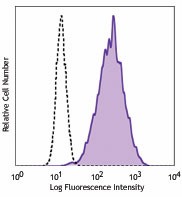
| Cat # | Size | Price | Save |
|---|---|---|---|
| 142603 | 25 µg | ¥29,480 | |
| 142604 | 100 µg | ¥65,780 |
CD49a is a 1179 aa, type I transmembrane glycoprotein also known as α1 integrin, VLA-1 α chain, or integrin α1. It associates antibody v042010 with CD29 (β1 integrin) to form the VLA-1 complex, a collagen IV and alminin-1 receptor that is expressed on activated T cells, smooth muscle cells, endothelial cells, neuronal cells, fibroblasts, and mesenchymal cells. CD49a is an adhesion molecule and is involved in the regulation of leukocyte migration, T cell proliferation, and cytokine production.
Product DetailsProduct Details
- Verified Reactivity
- Mouse
- Antibody Type
- Monoclonal
- Host Species
- Armenian Hamster
- Immunogen
- Mouse Neuroblastoma Cell Line C1300
- Formulation
- Phosphate-buffered solution, pH 7.2, containing 0.09% sodium azide.
- Preparation
- The antibody was purified by affinity chromatography and conjugated with PE under optimal conditions.
- Storage & Handling
- The antibody solution should be stored undiluted between 2°C and 8°C, and protected from prolonged exposure to light. Do not freeze.
- Application
-
FC - Quality tested
- Recommended Usage
-
Each lot of this antibody is quality control tested by immunofluorescent staining with flow cytometric analysis. For flow cytometric staining, the suggested use of this reagent is ≤0.25 µg per million cells in 100 µl volume. It is recommended that the reagent be titrated for optimal performance for each application.
- Excitation Laser
-
Blue Laser (488 nm)
Green Laser (532 nm)/Yellow-Green Laser (561 nm)
- Application Notes
-
Additional reported applications (for the relevant format) include: inhibition of cell adhesion and cytokine production1,2.
-
Application References
(PubMed link indicates BioLegend citation) -
- Miyake S, et al. 1994. Eur. J. Immunol. 24:2000. (FC, Block)
- Tanaka T, et al. 1995. Int. Immunol. 7:1183. (Block)
- Product Citations
-
- RRID
-
AB_10945158 (BioLegend Cat. No. 142603)
AB_10945158 (BioLegend Cat. No. 142604)
Antigen Details
- Structure
- 1179 aa, type I transmembrane glycoprotein
- Distribution
-
Endothelial cells, fibroblasts, activated T cells
- Function
- Leukocyte adhesion and homing; costimulation
- Ligand/Receptor
- Collagens, laminin
- Cell Type
- Endothelial cells, Fibroblasts, Mesenchymal Stem Cells, T cells
- Biology Area
- Angiogenesis, Cell Adhesion, Cell Biology, Cell Motility/Cytoskeleton/Structure, Immunology, Innate Immunity, Signal Transduction, Stem Cells
- Molecular Family
- Adhesion Molecules, CD Molecules
- Antigen References
-
1. Barczyk M, et al. 2010. Cell Tissue Res. 339:269.
- Gene ID
- 109700 View all products for this Gene ID
- UniProt
- View information about CD49a on UniProt.org
Related FAQs
- What type of PE do you use in your conjugates?
- We use R-PE in our conjugates.
Other Formats
View All CD49a Reagents Request Custom Conjugation| Description | Clone | Applications |
|---|---|---|
| Purified anti-mouse CD49a | HMα1 | FC |
| PE anti-mouse CD49a | HMα1 | FC |
| APC anti-mouse CD49a | HMα1 | FC |
| PE/Cyanine7 anti-mouse CD49a | HMα1 | FC |
| APC/Fire™ 750 anti-mouse CD49a | HMα1 | FC |
| PerCP/Cyanine5.5 anti-mouse CD49a | HMα1 | FC |
| TotalSeq™-A0850 anti-mouse CD49a | HMα1 | PG |
| TotalSeq™-C0850 anti-mouse CD49a | HMα1 | PG |
| TotalSeq™-B0850 anti-mouse CD49a Antibody | HMα1 | PG |
| PE/Cyanine5 anti-mouse CD49a | HMα1 | FC |
Customers Also Purchased
Compare Data Across All Formats
This data display is provided for general comparisons between formats.
Your actual data may vary due to variations in samples, target cells, instruments and their settings, staining conditions, and other factors.
If you need assistance with selecting the best format contact our expert technical support team.
-
Purified anti-mouse CD49a
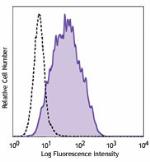
C1300 (mouse adenocarcinoma cell line) cells were stained wi... -
PE anti-mouse CD49a
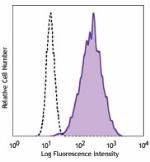
C1300 (mouse neuroblastoma cell line) cells were stained wit... -
APC anti-mouse CD49a
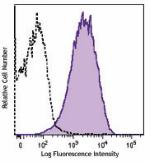
C1300 (mouse neuroblastoma cell line) cells were stained wit... -
PE/Cyanine7 anti-mouse CD49a
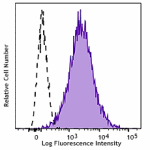
C1300 (mouse neuroblastoma cell line) cells were stained wit... -
APC/Fire™ 750 anti-mouse CD49a
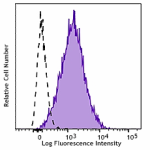
C1300 (mouse neuroblastoma cell line) cells were stained wit... -
PerCP/Cyanine5.5 anti-mouse CD49a
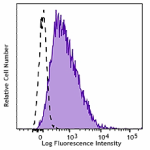
C1300 (mouse neuroblastoma cell line) cells were stained wit... -
TotalSeq™-A0850 anti-mouse CD49a
-
TotalSeq™-C0850 anti-mouse CD49a
-
TotalSeq™-B0850 anti-mouse CD49a Antibody
-
PE/Cyanine5 anti-mouse CD49a

C1300 (mouse neuroblastoma cell line) cells were stained wit...














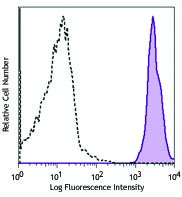
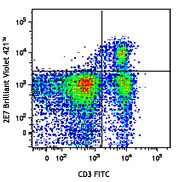
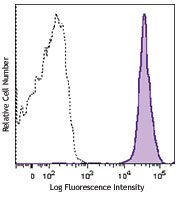
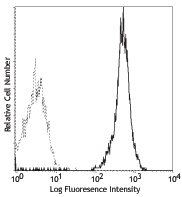



Follow Us